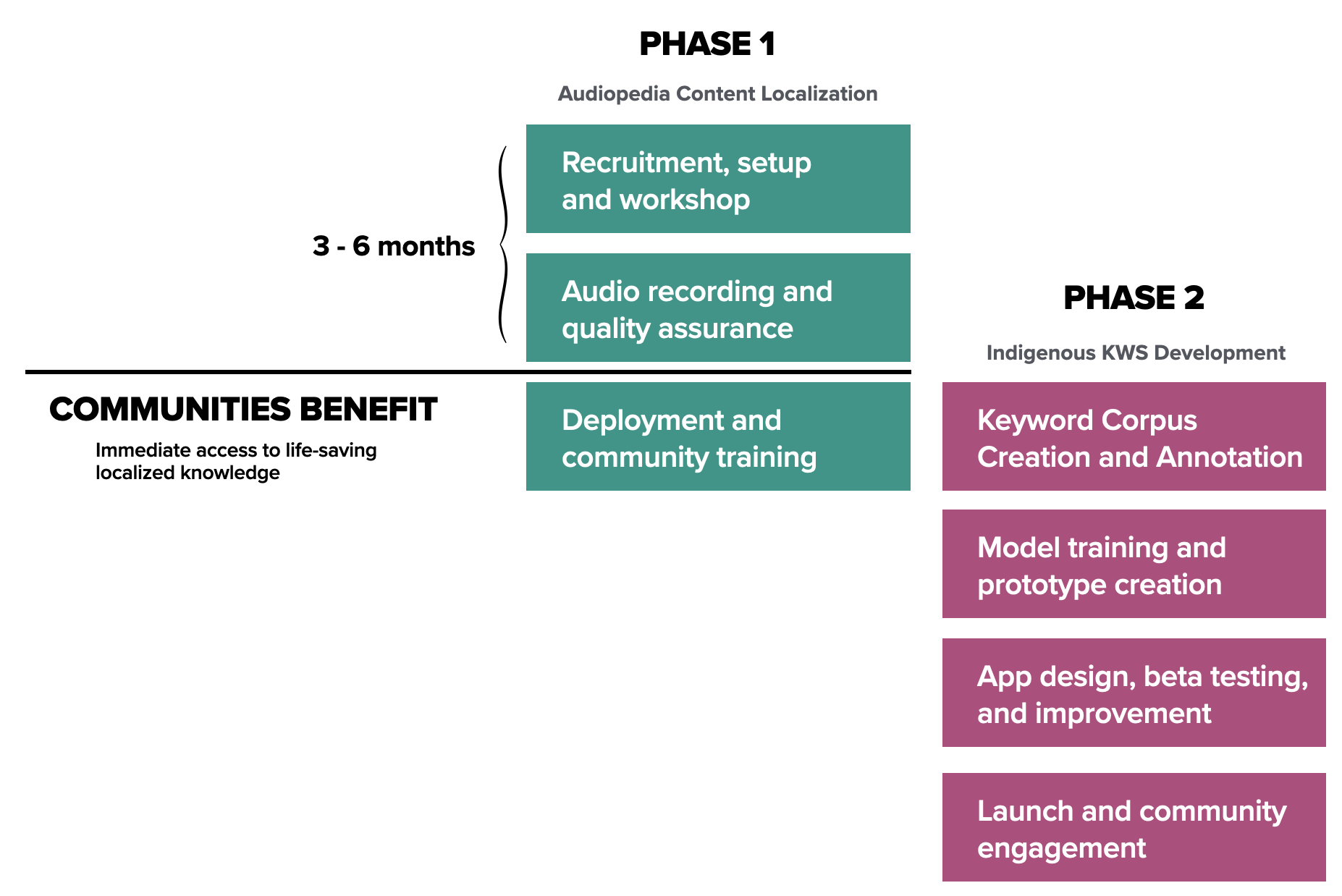The Audiopedia AI Framework
Empowering underserved communities through culturally adaptive, lightweight AI solutions designed for inclusivity and impact.
Concept and Approach
Audiopedia AI is a pioneering initiative that adapts Artificial Intelligence to the specific needs of indigenous communities. By integrating culturally localized content with lightweight Keyword Spotting (KWS) technology, this approach bridges the gap between oral traditions and modern digital solutions. The system delivers immediate, tangible benefits while preserving Indigenous languages, knowledge, and traditions.
The unique strength of this approach lies in its dual focus:
Immediate Community Impact: Disseminating culturally adapted Audiopedia content offline using solar-powered devices, SD cards, and local Wi-Fi hotspots.
Long-Term Value: Developing simple, efficient KWS systems that empower indigenous communities to access pre-recorded knowledge interactively and preserve oral languages.
Unique Features
1. Community-Driven and Culturally Adapted
- Content is co-created with Indigenous communities to reflect their knowledge, traditions, and practices.
- Local voices are recorded to ensure authenticity and cultural relevance.
- The system serves as a repository of Indigenous heritage while providing life-saving knowledge.
2. Offline-First Design
- The system functions independently of internet or electricity, ideal for remote, off-grid areas.
- Solar-powered audio devices, SD cards, and battery-operated speakers ensure accessibility for everyone.
3. Scalable and Replicable Blueprint
- Creates a low-resource, cost-effective KWS framework adaptable to other Indigenous languages globally.
- Provides a documented, step-by-step guide for future deployments.
4. Practical Applications
- Facilitates health chatbots and community learning hubs with voice-driven navigation.
- Empowers users to query pre-recorded content using simple keywords in their native languages.
Phases of Implementation
The project is structured into two key phases, each with distinct objectives and deliverables:
Phase 1: Audiopedia Content Creation
This phase focuses on building the foundation by creating and disseminating culturally relevant content:
- Recruitment and Setup: Engage local knowledge holders, linguists, and voice artists.
- Localization and Recording: Adapt, translate and record Audiopedia’s content (~120,000 words) into Indigenous languages, integrating traditional knowledge.
- Deployment: Distribute audio files using online and offline tools like solar-powered devices and SD cards.
Phase 2: Indigenous KWS Development
This phase leverages the content created in Phase 1 to develop a lightweight KWS system:
- Corpus Preparation and Annotation: Create a dataset of keywords from the localized recordings.
- Model Training and Optimization: Train KWS models to detect key health-related phrases (e.g., “child fever remedies”) using lightweight frameworks like TensorFlow Lite or PyTorch.
- App or Device Integration: Deploy KWS-enabled systems that link user queries to relevant pre-recorded audio responses.
Development Phases

Scalability and Adaptability
The modular approach ensures scalability and adaptability:
- For Indigenous Languages: The system can be adapted to other low-resource languages with similar needs, creating a global blueprint.
- Beyond Health Knowledge: While the pilot focuses on health, the system can expand to other domains like education, agriculture, and governance.
How It Works: A Practical Example
- A community member speaks a keyword (e.g., “child fever”).
- The KWS system detects the keyword and links it to pre-tagged Audiopedia content.
- The system retrieves and plays the corresponding pre-recorded audio response.
This intuitive, offline-first interaction demonstrates how the system bridges oral traditions with AI-driven solutions, providing immediate value to underserved communities.
Alignment with Community Needs
- Preserves Indigenous Identity: By integrating local voices and knowledge, the system reinforces cultural pride and continuity.
- Empowers Oral-First Communities: Provides a direct interface for accessing knowledge without requiring literacy or digital expertise.
- Addresses Immediate Gaps: Delivers life-saving, practical knowledge to communities that need it most.
Audiopedia AI offers a sustainable, inclusive, and culturally respectful approach to AI innovation, setting the stage for scalable impact in indigenous settings worldwide.